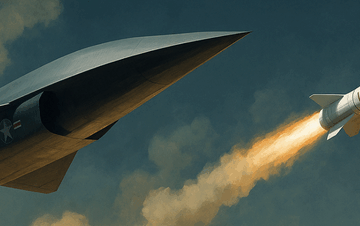Politics in Europe are growing increasingly unstable. The Starmer government in the United Kingdom (UK) is stalled and the German coalition of Gerhard Scholz dissolved, with elections coming. Under French President Emmanuel Macron, the government of Prime Minister Michel Barnier lasted barely three months, as it recently collapsed upon a no-confidence vote by a parliament where Macron lacks a majority.
In the UK, under Prime Minister Keir Starmer, gross domestic product (GDP) growth has stalled. PM Starmer committed to spending at least 2.5 percent of GDP on defense. However, funding has not materialized. A clear plan for future UK defense may not emerge until the Summer of 2025.
In Germany, left-of-center Chancellor Scholz dissolved his coalition, and the Christian Democratic Union’s Friedrich Merz is expected to take over with a right-of-center coalition after snap elections in the first quarter of 2025. However, the rise of the Alternative for Germany (AfD) party, whose leader recently chatted with Elon Musk, remains a wild card. Germany has yet to define and fund its defense budget at the 2 percent of GDP threshold.
Chancellor Scholz, who paid a last visit to Ukraine in early December 2024, committed to deliver Patriot systems in 2025. Merz wants to up the ante with the delivery of Taurus medium-range missiles to Kyiv. While the Ukraine dossier is being used as a political football, a root cause of the problem is that NATO’s defense math just does not add up.
In France, the downfall of the Barnier government stems from rejection of his budget. The new centrist prime minister François Bayrou now faces the same budgetary dead-end and parliamentary gridlock. Barnier was punished for trying to reduce the French deficit to 5 percent of GDP in 2025. The European Union (EU) rule is 3 percent as the maximum.
France’s current deficit is over 6 percent of GDP and might end up closer to 7 percent. France is in third place for debt-to-GDP ratio at 111 percent. Only Greece and Italy have a worse situation.
The EU average is 82 percent, with Germany maintaining a healthy 62 percent. There is a looming debt crisis, and it will not be possible to kick the can down the road forever. France already passed its 2024–2030 Military Programming Act (Loi de Programmation Militaire).
President Macron is committed to seeing it through until the 2027 presidential election. Yet the funding needs to be in place for France to remain the top European spender in civilian and military space.
At the other end of the spectrum is Denmark, Estonia, Finland, Iceland, Latvia, Lithuania, Norway, and Sweden. These Nordic and Baltic states clearly lead the way, as they are all becoming increasingly significant players in European security. In particular, Sweden and Finland’s membership in NATO plays a central role in securing the High North and deterring Russia, as these two countries continue to supercharge NATO’s deterrence.
Meanwhile, Russian President Vladimir Putin placed his economy on a war footing. His defense budget steadily increased over the past two years. Of course, this strains society’s resources and patience after nearly three years of war. The vast majority of Russian society is wired to bite the bullet and take the pain for as long as necessary until an endgame pans out. And for good measure, Putin will maintain his nuclear swagger at the highest level.
For the West, it is time to think deeply about deterring the use of low-yield theater nuclear weapons. This is a capability that not only Russia but China has deployed in great numbers and is in the process of augmenting.
The latest uncertainty comes from NATO member Romania. The courts unexpectedly nullified the results of the first round of presidential elections—deeming them unlawful because of alleged Russian interference.
The establishment candidate, who favors EU and NATO, is likely to win. But blaming the surge on an alleged TikTok-driven Russian conspiracy misses the deeper picture: across Europe, from France to Germany to Austria to Hungary to Romania, there is a rising wave of discontent with the current European order. Thus, “extremist” parties are supported in disrupting mainstream left-of-center politics.
The grapes of wrath stem from stalled economies, unwanted immigration from Africa and the Middle East, growing crime and social disruption, and a welfare state that cannot afford both native born citizens and the influx of immigrants. Europe’s wealth level gap with the United States is 30 percent and growing.
By culture, Europe disdains billionaires and even taxes or tries to interdict their free speech, as exemplified in a recent exchange on X (Twitter) between former European Commissioner Thierry Breton and Elon Musk. Not wired for animal instinct, creative destruction, freedom of innovation, entrepreneurship, and disruptive capitalism, European socialism loathes wealth creation as a positive value.
Even though history shows that socialism only leads to failure, or, in the words of Lady Thatcher, “running out of other people’s money,” Europeans tend to shrug and call that state of things “Venezuela without the sun.”
As long as this does not change, the best and the brightest will keep flocking to the US, be it from India, Latin America, or South Africa. To say that it is time for Europe to get its act together would be an understatement. Europe needs to understand that it can never develop into an autonomous power without the free creation of wealth, which is required to fund the defenses Europe requires.
Christophe Bosquillon is a Senior Fellow at the National Institute for Deterrence Studies. He has over 30 years of international experience in general management, foreign direct investment, and private equity and fund management across various industries in Europe and the Pacific Basin. The views expressed in this article are the author’s own.
About the Author

Christophe Bosquillon
Christophe Bosquillon is a Senior Fellow at the National Institute for Deterrence Studies. He has over 30 years of international experience in general management, foreign direct investment, and private equity and fund management across various industries in Europe and the Pacific Basin.




